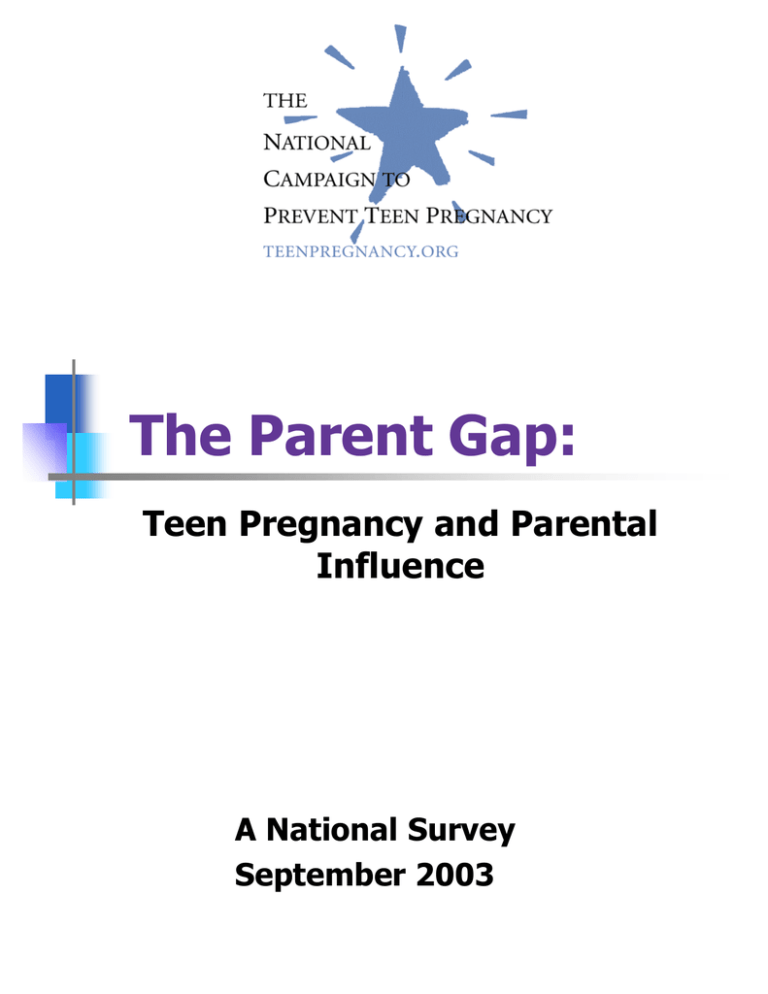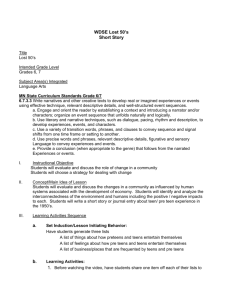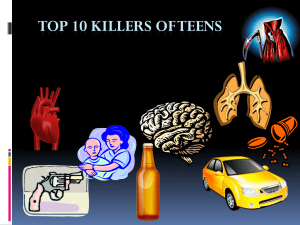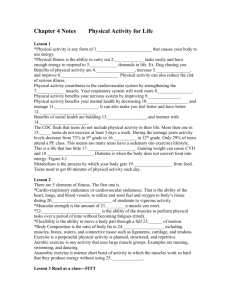The Parent Gap: Teen Pregnancy and Parental Influence A National Survey
advertisement

The Parent Gap: Teen Pregnancy and Parental Influence A National Survey September 2003 Introduction Since our inception in 1996, the National Campaign to Prevent Teen Pregnancy has championed the power of parents. Common sense, two decades of research, and our own interactions with teens over the years, makes clear that while parents clearly cannot determine their children’s decisions about sex, the quality of their relationships with their children can make a real difference. In a continuing effort to measure the attitudes and beliefs of adults and teens toward teen pregnancy and related issues, the National Campaign recently commissioned International Communications Research, one of the largest independent and privatelyheld research companies in the United States, to conduct nationally-representative surveys of adults (age 20 and over) and teens (aged 12-19). The new survey results presented here focus specifically on what adults and teens had to say about parental influence. Additional data from these two surveys will be released later in 2003. The Parent Gap: Teen Pregnancy and Parental Influence provides good news for parents as well as several cautionary findings: § When it comes to their decisions about sex, parents have not lost their children to the influence of peers and popular culture. Teens say that parents influence their decisions about sex more than anyone else. Nearly half (45%) say parents are most influential – less than a third (31%) say friends are most influential. For young teens (aged 12-14), parental influence is even greater. Over half of young adolescents (53%) say parents most influence their decisions about sex, while 24% cite friends as most influential. § For their part, however, many parents seem to be having a crisis of confidence – adults continue to underestimate the influence they have over teens’ decisions about sex and overestimate the influence of others, such as their teens’ friends and the media. Nearly half (48%) of adults says friends are most influential, while only 32% believe that parents most influence their children’s decisions about sex. 2 § Moreover, while the overwhelming majority of young people (88%) say it would be much easier for teens to postpone sexual activity and avoid teen pregnancy if they were able to have more open, honest conversations about these topics with their parents, nearly one in four (23%) say they have never discussed sex, contraception, or pregnancy with their parents. Parents might also be interested in noting that the percentage of teens who believe it would be much easier for teens to postpone sex and avoid teen pregnancy if they were able to have open, honest conversations about these topics with their parents increased nearly 20% between 2002 and 2003 (from 69% in 2002 to 88% in 2003). § About one in five (19%) young adolescents say that in the past six months alone they have been at a party with boys and girls where there were no adults in the house. § Finally, parents may be surprised to learn that a clear majority (59%) of teens consider their parents to be role models of healthy, responsible relationships. The Parent Gap is the latest in a series of ongoing survey work conducted by the National Campaign. Previous polling results can be found on the Campaign’s website at: www.teenpregnancy.org/resources/data/polling.asp. 3 Question #1 “When it comes to teens’/your decisions about sex, who is most influential?” Percentage of teens and adults who answered 32 Parents Friends 4 Teachers and Sex Educators 3 Religious Leaders The Media 4 Myself 45 48 31 6 7 11 Adults Teens 3 Siblings 1 Somone Else 1 2 1 Don't Know/Refused 0 10 20 30 40 50 60 4 Question #1, continued Percentage of teens who answered, by gender and age 47 Parents 44 31 Friends 32 4 Teachers and Sex Educators 7 8 Religious Leaders 6 3 The Media Myself Female Teens 6 3 Male Teens 2 Siblings 1 1 1 Somone Else 2 Don't Know/Refused 1 0 10 20 30 40 50 60 41 Parents 53 36 Friends 24 4 Teachers and Sex Educators 9 7 Religious Leaders 5 The Media 3 Myself 7 Teens aged 15-19 5 Teens aged 12-14 Siblings 1 1 Somone Else 2 Don't Know/Refused 2 2 0 10 20 30 40 50 60 4 Question #2 “Do you agree or disagree with this statement: ‘It would be much easier for teens to postpone sexual activity and avoid teen pregnancy if they were able to have more open, honest conversations about these topics with their parents.’?” Percentage of teens who answered 2003 12% Agree Disagree 88% 2002* 2% Agree 29% Disagree 69% Don't Know/Ref used *The national Campaign asked the same question of a nationally-representative sample of young people aged 12-19 in 2002. 5 Question #3 “The last time you discussed sex, birth control, or pregnancy with your parents, who started the conversation?” Percentage of teens who answered, by age. 26 Teens aged 15-19 Teens aged 12-14 17 You Did Teens aged 12-19 (net) 23 52 Your Parents Did 53 53 You Haven't Had a Conversation About These Topics With 0 20 28 23 20 40 60 6 Question #4 “Among the following, when it comes to healthy, responsible relationships, who is your role model?” Percentage of teens who answered Your Parents 59 Your Friend's Parents 4 12 Your Friends Celebrities 2 Other Family Members 5 Sibling 3 Religious Leader 1 Myself 1 Someone Else 1 11 You Don't Have Any 1 Don't Know/Refused 0 20 40 60 80 8 Question #5 “In the past six months, have you been at a party with boys and girls where there are no adults in the house? Percentage of teens who answered yes, by age. 57% 42% Teens aged 12-19 (net) Teens aged 12-14 Teens aged 15-19 19% 10 Methodology and Sample The National Campaign to Prevent Teen Pregnancy’s survey, The Parents Gap: Teen Pregnancy and Parental Influence, is based on two national surveys, one of young people aged 12-19 and the other of adults age 20 and over. Of the adults interviewed, 79 percent were parents. The survey was designed by the National Campaign with assistance from International Communications Research (ICR). The teen survey is weighted to provide a nationally representative estimate of young people aged 12-19. Field work for this survey was conducted between August 21 and September 10, 2003. Telephone interviews were conducted by ICR with 1,000 young people. The sample for this study was drawn using using two different methods. The first sample source used random Digit Dial (RDD). RDD numbers are drawn from telephone households throughout the continental United States. As a second sample source, a database of households with teenagers 12-19 year old was tapped. All interviews were conducted using the Computer Assisted Telephone Interviewing (CATI) system. The CATI system ensures that all questions were rotated and that when answer options were presented, they were also rotated. This rotating eliminates “question position” bias. The margin of error for this survey is +/- 3.10%. The adults survey is also weighted to provide a nationally representative estimate of the adult population, 20 years and older. Field work for this survey was conducted between August 20-24. Telephone interviews were conducted by ICR with 1,008 adults. This survey was done as part of a national, twice-weekly telephone omnibus survey using a fully-replicated, stratified, single-stage RDD sample of telephone households. Sample telephone numbers are computer-generated. The margin of error for this survey is +/- 3.09%. 12





